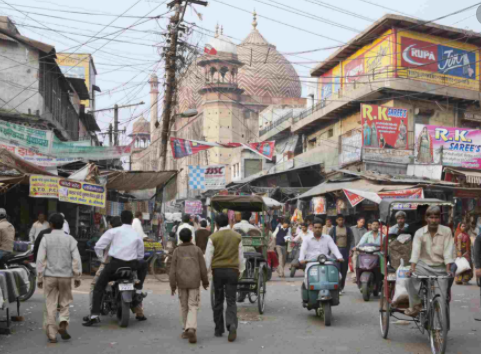Bharat Jhunjhunwala
Many thinkers – Gandhians and others – favoured a village-centric growth strategy. The argument is that we cannot bear the economic load of urbanization; that urban living is impersonal and disrupts human relationships; and that urbanization is synonymous with centralised governance in which people are disempowered.
It is contended that local production for local needs is the ideal that we should aim at. The problem, however, is that recent advances in technology have reduced transport costs to such a degree that the meaning of ‘local’ has been transformed. In the new technological scenario, instead of trying to revive our villages, we must focus on humanising our cities.
The hard fact is transport technology determines whether a particular item will be produced in village or city. This can be shown by an example. Rice earmarked for village consumption is milled in the mini-rice-mill in village. But rice meant for consumption in city is milled in large rice mills generally located near a city. Paddy has to be transported from village to the city for consumption. It can be milled in village and rice can be transported to city. Alternatively, paddy can be transported to city, milled in city and rice supplied to city. Now, if rice has to be milled in village, then only a small rice mill is sufficient for milling the rice grown in village. The cost of milling in a small rice mill is more and the quality of rice produced is relatively poor. There is also a loss of rice bran. Thus, milling paddy in village is costly and businessmen prefer to transport paddy from village to large rice mills in the city.
In contrast, a sugar mill is almost always established in a rural area. Reason is that 10kg of cane is required to produce 1kg of sugar. Thus, it costs less to transport 10kg of cane a short distance to a rural sugar mill and then transport 1kg of sugar long distance to the city. It would cost much more to transport 10kg of cane long distance to an urban sugar mill and then transport 1kg of sugar short distance to the nearby city. The total cost of transportation of cane and sugar combined is much less if a sugar factory is located in a rural area. Thus, we see that rice mills are established in cities and sugar mills in rural areas. For this reason, we simply cannot establish industries that are not dependent on high-weight agricultural products in villages. In this was the development of transport technology that has killed villages.
Roads have now been constructed in tribal areas; electricity has reached those in the desert; and villages of Haryana get water from Himachal. The number of items that can be produced in a village has competitively shrunk. At one time, the village had its own potter and smith. Nowadays, they buy plastic pitchers and machine-made implements. Now, the village cannot also manage its agriculture in a standalone manner because diesel, water and electricity are now obtained from city. It is uneconomical for village to maintain these ‘local’ trades now because it is more economical to pay `20 to a roadways bus conductor and get the same product from the city. The village trades have but to die as also the myth of an autonomous village.
The same holds for self-governance. Once the life of the citizen is integrated with the city – TV, electricity, and motorcycle – the area of autonomy of the ‘local’ community stands reduced. Needless to say, the cities are also not able to practice self-governance. The supply of petrol is from other countries, the electricity grid has become national, and drinking water is brought often from other states. Self-governance is not practicable today in the village or the city.
It is necessary to make large investments in the centralised industries to protect our economic sovereignty. Canal irrigation, electricity and television require heavy investment in centralized industry. The nation has to make a difficult choice. We can use our output to first build our power stations; or to build our villages. The problem is that if we take up village development first, then we will perpetually condemn ourselves to the backwardness of the clay pots and wooden ploughs.
This compulsion had forced our pre-Independence leaders explicitly state in the Bombay Plan made in the 1940s that the investment in industry will come mainly from the surplus extracted from agriculture. We have then two choices – we either have to ‘exploit’ our villages while we invest our surplus in industry so that we break free of the dependence on foreign capital; or we can take up village development and surrender our economic sovereignty to the global capital.
Instead of trying to revive our villages, we must focus on humanizing our cities. A half-way possibility is to revive the small towns instead of focusing only on the large cities. The cost of provision of services such as electricity, piped water and bus routes will perhaps be only marginally more than the cost of supplying these services in the cities; while it will be substantially less than supplying these services in the villages.
The small towns can become suppliers of services such as translations, online tutorials, music and call centres. Living conditions such as a pollution-free environment can also be more easily provided here. There is greater inter-personal interaction as well. Town-dweller often knows his vegetable vendor by name, for example. There is a huge movement from the city centres to the suburbs in the developed countries for these reasons. We can move in that direction.
Agriculture basically is a sunset area. However, Netherlands is producing tulips, France is producing grapes and Italy is producing olives of good quality with international markets. The way to revive the both the small towns and villages is to undertake research on niche agricultural products like pepper in Kerala and apples in Kullu. The town of Chhutmalpur in UP is a huge supplier of vegetables from the nearby villages. Such small towns supplying gladiolus and rose flowers can certainly be developed.
The writer is a former professor of IIT, Bangalore.






































